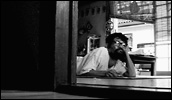Late Bloomer
- Year
- 2004
- Original title
- Osoi Hito
- Japanese title
- おそいひと
- Director
- Cast
- Running time
- 83 minutes
- Published
- 11 May 2005



by Nicholas Rucka
As I begin this piece, I need to mention that the director of this film, Go Shibata, is a good friend of mine. Though we disagree about when exactly we first met, I clearly recall having a rather crazy night with lots of yaki-niku and shochu with him and the other Osaka Geidai (art university) students sometime around late spring 1998. At that time Shibata-san was finishing up his first feature film NN-891102 and was very excited to show it to me - little did I know that in a year I'd end up translating and subtitling it.
NN-891102 is not a polished movie. There are sound problems, occasional exposure issues, scratches on the negative, some crude production design elements, and other flaws indicative of a debut work. But the thing is, the film seethes with energy and excitement.
Shibata seems to work off of instinct and he doesn't sweat whether people will really 'get' what he's doing. That's not to say he doesn't want an audience, but the truth is either you get his stuff or you don't. But even if you don't get it, you'll always find something interesting and different in his films.
Which brings me to his phenomenally energetic and exciting new film, Late Bloomer, which took nearly five years to make.
To best describe the film, one can say that it has the best elements of Tetsuo: The Iron Man, Battles Without Honor and Humanity, Taxi Driver, Freaks, and Psycho. There are elements of directors Koji Wakamatsu, Werner Herzog, Alejandro Jodorowsky, and Herschell Gordon Lewis in the film too. At times Late Bloomer has a Japanese New Wave quality to it in its immediacy and penchant for hand-held camera work and at other times the film spins off towards pure music video territory. Most assuredly, the collusion of these elements should not be viewed as a bad thing, nor should they discount the film itself. Late Bloomer is almost like improv jazz: riffing on a little bit of everything.
Late Bloomer is the story of Sumida, a severely handicapped man, and his downward spiral into hell. When we're first introduced to him we find that despite his physical limitations - and contrary to cultural misconceptions about the handicap - he has all of the desires and personality traits of a physically normal man. Specifically: he loves to party, eat good food, and 'rock out' to his caregiver Take's hardcore band. However, Sumida's life begins falling apart when he develops a crush on his new occasional caregiver, Nobuko. Needless to say, the feelings are not reciprocated and when Nobuko starts spending her free time with Take, Sumida-san is driven mad with desire and frustration and things take a turn for the worse…
In the interview which accompanies this review, director Shibata talks about how Late Bloomer grew out of a desire to confound cultural misconceptions and prejudice against the handicap. He himself admits that he was guilty of these cultural biases and claims that one of the most important things he had to overcome during the shooting of this film (comprising the first year and a half of its total production time) was the emotional and social distance that existed between Sumida and himself. This distance is reflected in the type of popular cinema that is produced featuring handicapped people: a particularly safe brand of generic art.
It seems that the world over, the accepted films featuring the handicapped would be best called the 'triumph story': the overcoming of great odds to achieve even greater goals. The reason for these films appears to be catharsis. Specifically, the audience watches them to feel better about their own lives ("There but for the grace of God go I…"), draw inspiration to live a better life ("If they can do it, so can I."), and, to some extent, feel generally swell about themselves and the way they spent two hours watching something 'socially responsible'. Fortunately this style of filmmaking appeared both absurd and disingenuous to both Shibata and Sumida, and in response they created a film that was truly the opposite.
Returning to the topic of distance, Shibata said to me at one point that it was only after half a year of shooting that the distance between him and Sumida started to shorten - and in a sense, that was when the film started to take on its true form. According to Shibata the distance between both he and Sumida continued to abate even after the shooting was wrapped. He states that one of the positive aspects of the film taking as long to complete as it did was the eventual discovery of the true emotional heart of the film, as a result of the distance being bridged.
Which brings me to a key point about why this film, though containing all of the tell-tale signs of an exploitation flick (violence, sex, and random cruelty), is anything but that: we care about Sumida. Specifically, we identify with his frustrations and feel the emotional sting of injustice at being handicapped and regarded as less than human.
There's no denying it, Late Bloomer sticks with you for a long time after it's done and has you chewing on this point. While as a viewer you recognize that what Sumida-san has done is reprehensible and should be without absolution, his actions do make some sense. While not a justification of violent behavior, the film makes it hard to be critical of Sumida when you're sympathetic to him and you're angry for him. And you're hurt for him. This is where Shibata has made Late Bloomer truly a unique film.
This, it should be noted, is not new territory for Shibata. He explored similar themes in his debut feature film, NN-891102. In both films the audience becomes oddly sympathetic to the protagonist, regardless of how brutal their actions might be. I believe that at the heart of his two films, Shibata wants the audience to not be so judgmental of others, and to take the time to learn about why certain people act and make the decisions that they do. While yes it's true, life isn't fair, it is possible to learn to be more empathetic about others and view situations and people in a more accepting manner. More so if we watch films like this and consider the feelings, opinions, emotions, views and the like, which are explored on screen.
Addressing the technical aspects of the film, it was shot entirely on digital video using three cameras, more out of necessity rather than for artistic purpose. The cinematography is of a standard documentary video quality and with the exception of a few points, is nothing to write home about. That being said, Late Bloomer is unique in its stripping, in post production, of all its color palette. What's left is a slightly murky 16x9 image primarily rendered in gray scale as the result of a lack of proper film lighting, with the occasional high contrast scene featuring crushed blacks and sharp whites. While I wasn't crazy about the shooting style in general, there are the occasional moments of brilliance in the film when the black and white cinematography, mise-en-scene and montage all come together to create strong imagery.
The music is another story and is also quite unique. Having been composed in part and culled from the CDs of electronic music artist World's End Girlfriend, the soundtrack is unlike almost any film that is currently in release. In fact, it's a rare day that you hear underground electronic music like this in ANY film and it adds nicely to the overall experience, from the first electronic voice sample announcing "Nice to meet you" right at the start of the film, to the delicate and morose music that underscores the end of the film. Shibata couldn't have found a better and more unique musical fit.
Late Bloomer is without question one of the best films that has come out of Japan recently and I can only hope that it will continue its festival run, secure a proper domestic and international distribution deal and screen widely enough so that more people can appreciate this unique work of an emerging talent. The film world in general needs more films like this and I look forward to seeing Shibata's next film. Hopefully it will take less than five years.